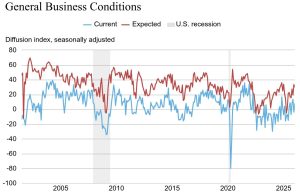Since President Donald J. Trump announced his bold tariff strategy — aimed at leveling the playing field by placing reciprocal tariffs on nations that tax American-made goods and bolstering U.S. manufacturing — media pundits and so-called experts have been tripping over themselves to predict economic doom. But once again, the political class is out of […]
Already an Subcriber? Log in
Get Instant Access to This Article
Become a Central New York Business Journal subscriber and get immediate access to all of our subscriber-only content and much more.
- Critical Central New York business news and analysis updated daily.
- Immediate access to all subscriber-only content on our website.
- Get a year's worth of the Print Edition of The Central New York Business Journal.
- Special Feature Publications such as the Book of Lists and Revitalize Greater Binghamton, Mohawk Valley, and Syracuse Magazines
Click here to purchase a paywall bypass link for this article.
Since President Donald J. Trump announced his bold tariff strategy — aimed at leveling the playing field by placing reciprocal tariffs on nations that tax American-made goods and bolstering U.S. manufacturing — media pundits and so-called experts have been tripping over themselves to predict economic doom.
But once again, the political class is out of touch with the American people, who understand what’s at stake and largely support Trump’s correction of an upside-down approach to global trade that has left the U.S. manufacturing sector hollowed out and carried dire economic, social, and political consequences.
In a robust new Harvard CAPS-Harris survey from April 9-10, more than half of Americans — 53 percent — say that tariffs are necessary medicine for the U.S. to get a fair shake in global trade.
Americans assert that China has taken advantage of the U.S. for far too long and believe President Trump’s tariffs are the right strategy for the long term.
The largest share of Americans — 48 percent — say that the Trump Administration’s tariffs are the right idea but require more patience to work. The poll found 31 percent of people saying Trump’s tariffs are the wrong idea entirely, while 21 percent say tariffs are the right idea but have been executed poorly. The message is clear: Americans are willing to shoulder short-term discomfort if it means long-term strength for our economy and a revival of U.S. manufacturing.
Harvard CAPS-Harris also found that Americans largely agree with President Trump’s assertion that for far too long trade deals have been structured to leave America at a global disadvantage while benefiting nations like China.
A full 59 of Americans say China is taking advantage of the United States on trade, with 72 percent of Republicans, 57 percent of independents, and even 46 percent of Democrats agreeing that China has been taking advantage of the U.S. on trade.
This low opinion of the America’s trade relationship with China echoes a March survey from the Pew Research Center, which found that Americans have the lowest view of trade with China between three major trading partners, and say by a margin of 46 percent to 10 percent that our trade relationship with China benefits China more than Americans.
Unsurprisingly, the Harvard CAPS-Harris poll found substantial support for placing reciprocal tariffs on other nations that place tariffs on American-made goods, with 57 percent of Americans supporting placing reciprocal tariffs on nations that impose tariffs on U.S. goods.
When asked directly if President Trump’s reciprocal tariffs should be maintained or removed, a majority of Americans — 52 percent — either say that reciprocal tariffs should be maintained for the foreseeable future or at least until other nations remove their tariffs on U.S.-made goods. Only 20 percent of Americans want reciprocal tariffs removed on our largest trading partners — including the European Union (EU) and China — without those regions reciprocating. The poll found 28 percent of respondents favor removing tariffs altogether.
Half of Americans also support placing tariffs on goods imported from China, Mexico, and Canada, to encourage U.S. manufacturing specifically.
There is relatively strong bipartisan support for President Trump’s assertion that tariffs are necessary to even the playing field in global trade. Republicans say by over a three-to-one margin that tariffs are necessary to give the U.S. a fair shake in global trade, with 78 percent of Republicams supporting tariffs while 22 percent oppose them.
Independents are split, with 50 percent saying tariffs are necessary to give America a fair shake in global trade and 50 percent opposing tariffs. Bucking the trend, Democrats say by a margin of 72 percent to 28 percent that tariffs are unnecessary.
Still, the fact that nearly 30 percent of Democrats believe tariffs are necessary to course-correct a trading scheme that has left the U.S. at a significant disadvantage is telling.
Democrat elected officials in Rust Belt states have to walk a fine line between opposing tariffs because Trump is the one implementing them, while simultaneously attempting to recoup losses among working-class voters who have been knocked sideways by global trade.
Even organized labor is speaking out. Unions, which historically represented working-class voters and aligned with the Democratic Party, have been straddling the line between support for Trump’s tariffs and sticking with the modern, anti-Trump wing of the Democratic Party.
In an interview with the Boston Herald, Teamsters President Sean O’Brien expressed his frustration with Democrats for having “lost the working class” and said if Trump’s tariffs bring back “good-paying, middle-class jobs,” it is worth all the pain.
United Auto Workers (UAW) president Shawn Fain also went on the record in late March praising Trump’s move to place tariffs on vehicles and auto parts imported into the U.S., calling them a “tool in the toolbox” to bolster U.S. manufacturing.
If Democrats are not careful, their reluctance to find a long-term solution to the manufacturing crisis and even the playing field on global trade could drive a permanent wedge between themselves and what remains of their support from the working class.
While Americans express concern for higher prices due to the implementation of tariffs on cheap foreign goods, a majority of voters are willing to endure higher prices in the short term in order to reap a more robust U.S. economy in the years to come.
Manzanita Miller is the senior political analyst at Americans for Limited Government Foundation, the research arm of Americans for Limited Government, a libertarian political advocacy group. The organization conducts policy research and publishes reports with the goal of reducing the size of the government.
Manzanita Miller is the senior political analyst at Americans for Limited Government Foundation, the research arm of Americans for Limited Government, a libertarian political advocacy group. The organization conducts policy research and publishes reports with the goal of reducing the size of the government.



